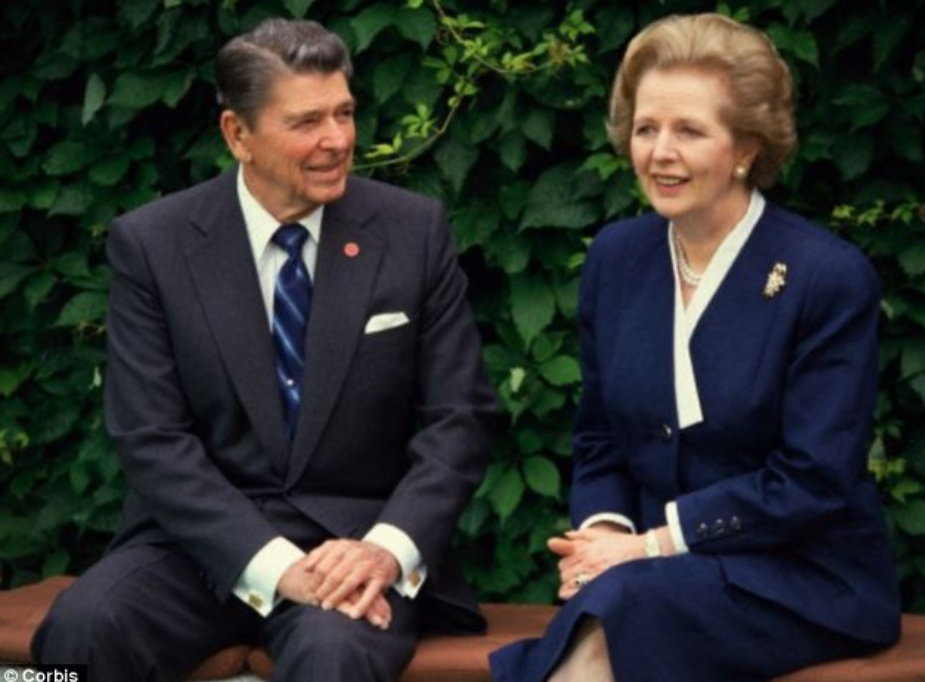Did the Brits Get Conservatism Right?
Did the Brits Get Conservatism Right?
Margaret Thatcher offers many salient lessons for America’s political right.
(President Ronald Reagan sits next to Prime Minister Margaret Thatcher. Source: The Reagan Files)
Culture wars are replacing American traditional fiscal conservatism, neglecting the most important tenet of conservative values: fiscal matters.
Traditional conservatism has exhibited an omnipresent force within the mainstream political landscape of American postwar politics and society through a variety of administrations and individuals. A strong, clear, and idealistic message of prosperity, equality, and fiscal responsibility buoyed conservatives to victory in elections. In popular culture they reached celebrity status, ranging from liberators of fascist Europe like Dwight D. Eisenhower to the charismatic Ronald Reagan and his beloved Maggie Thatcher of England, who preached a similar message.
However, conservatism shifted. The currents of populism and fiscal irresponsibility antithetical to the true conservative movement have taken root, while its foundations continue to sail off into the sunset.
While seemingly an isolated sect in the modern U.S political arena, traditionalist conservatives detail the pages of world history. Few foreign conservatives are more recognizable than Margaret Thatcher, England’s first female Prime Minister, and an earnest partner of the “special relationship” between Ronald Reagan, England, and the U.S.
The story of Margaret Thatcher following the election of 1983 represents a conservative triumph in a traditionalist sense. Few times in history has an individual with a strong electoral mandate taken advantage of auspicious political tailwinds in a manner which continued to deliver undeniably effective policy creations—whether despised or loved.
For most middle to upper crust Britons, Thatcher remains a figure of legendary status as one of the greatest Prime Ministers since the position began within the constitutional monarchy system. She embraced free markets to their fullest. She created a regressive tax policy. New industries, especially service industries like finance, replaced dying heavy industry such as coal mining and steered the economy towards a direction of strong and confident growth. Festering state-run industries like utilities were privatized to promote efficiency. Budgets were slimmed. Spending tightened. Middle class families renting public housing developments were given affordable opportunities to buy their residences, resulting in nearly two-thirds of the nation owning their homes. Economic growth and optimism soared to levels not seen since the end of the First World War.
A disjointed Labour Party could neither collect itself nor challenge the strength of Thatcherism at its peak. However, not all sang “Rule Britannia.” The working classes suffered as jobs simply vanished with the rapid transition of the economy away from manufacturing and unskilled labor. The Community Charge, or Poll Tax, subjected the poor and working classes to the same flat tax rates as the rich, commencing a decline in support for Thatcherism that even ardent parliamentary allies began to question. The Iron Lady did not benefit all, but positively affected the economy and fiscal wellbeing of many Britons in a significant manner by the time of her resignation in 1990.
History always compares Thatcher, her policies, and love of the free market to Reagan. However, comparing Thatcher with our present view of conservatism demonstrates how very much the American conservative movement has shifted away from its most salient tenets for the worse, as well as what American conservatives might learn to recenter themselves.
When Donald Trump won the presidency in 2016, he began an erasure of nearly thirty years of cohesive conservative ideals underpinned by fiscal prudence. In 2024, the conservative movement in the U.S. stands fragmented, disjointed, and defined by culture warriors exhibiting little substance upon which to establish their ideology other than evangelical Christianity and a slew of logical fallacies. Electability is unpredictable. Modern conservatism is simply too ideologically inconsistent and wishy-washy for the American voter. As ideological civil wars rage within American conservatism, the separation grows wider, and their collective power diminishes.
Working class populism, anti-globalism, isolationist rhetoric, and increased government expenditures under the guise of smaller government now join culturally insensitive attacks on groups that do not tidily fit into the current movement. Conservatism appears to be devouring itself and its very beginnings. One cannot help but wonder if there will be any resemblance of conservatism after the 2024 presidential election should the movement remain unable to define itself, wandering about like a headless chicken.
What does Thatcher have to do with any of this?
First, she was an unafraid fiscal ideologue. Free trade, free markets, and economic prosperity towered over the minutiae of social differences that have hijacked the contemporary right. A strong willed, yet believing leader emerged through Thatcher. Tenets were clear — crystal clear.
Margaret Thatcher demonstrated that, when fiscal moderation and economic free market emphases define mainstream conservative ideology, things get done and people listen.
American conservatives must have principles to win elections. These must be sensible ideological principles. For a return to a strong and unified front, conservatives ought to return to their roots founded upon an unwavering commitment to fiscal restraint, as well as an understanding of responsibility to common wellbeing through social moderation.
While perspectives change and new chapters of history alter the perceptions of modernity and ideology, some political formulas, though labeled as characteristic of an older time, reemerge to become the status quo. This realization may require an uncommon level of common sense, wit, and commitment to what is tried and true within conservatism. Perhaps, we conservative Yanks and Maggie might be able to share a cup of tea over that.
[This op-ed was written for Professor Mikki Brock’s History of Poverty in Britain course in Winter 2024.]
[The opinions expressed in this magazine are the author's own and do not reflect the official policy or position of The Spectator, or any students or other contributors associated with the magazine. It is the intention of The Spectator to promote student thought and civil discourse, and it is our hope to maintain that civility in all discussions.]


